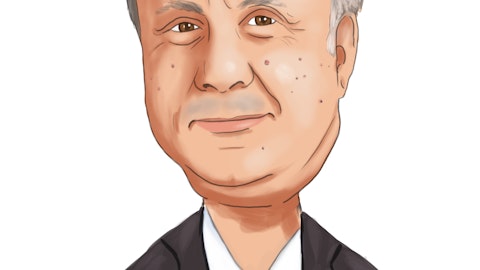And we don’t think we’ve been particularly aggressive, especially when doing analysis on the actual HCCs that we’ve been going for in the past. So, we don’t expect a headwind from RADV either. I think overall, we are not foreseeing headwinds in terms of Medicare premiums, PMPM for our patients going into 2024.
David Larsen : Okay. That’s very helpful. And then just one last quick one. If we assume Medicaid is around 24% of revenue, let’s say, 15% of Medicaid lives are redetermined. In total, that seems like it’s maybe around 4% of revenue for Apollo Medical spread over, say, two years, which would be maybe 1% or 2% of impact in revenue annually for Medicaid redetermination to you guys. Does that sound reasonable or not? I mean, it doesn’t really sound that material to me.
Chan Basho: Yes. I think your structure, David, is spot on. I don’t think we’re seeing the level of redetermination in terms of the 15% range.
David Larsen : Okay.
Chan Basho: I would probably assume maybe half of that.
David Larsen : Okay. So, the drag for Medicaid redetermination will be even far lower than what I had initially said?
Chan Basho: Yes.
David Larsen : Okay. All right. Super. Congrats on a good quarter.
Operator: [Operator Instructions]. And we’ll take our next question from Gary Taylor from TD Cowen. Please go ahead.
Gary Taylor : Good evening. I had two quick questions. One, the midpoint of the EBITDA guidance of about $2.5 million, is it fair to think that’s roughly the magnitude of the ACO true-up in the quarter? Or would you steer us materially differently from that?
Chan Basho: I think it’s more than just an ACO true-up. We are experiencing very strong overall sweeps payments. So, I’d say that’s number one. Number two, it is the MA RKKs and membership moving to those MA RKKs. And number three is the ACO that you mentioned. And of course, we’re seeing and we’ve mentioned this before, we are continuing to invest in new market development. I’d say our new market development overall, I think we’d said about $5 million to $10 million per market, those investments are coming in at the lower end of the range.
Gary Taylor : Got it. And then my other question would be just a follow-up on redeterminations. The Medicaid MCOs are — seeing either — you can either call it adverse selection or higher acuity and they claim that the states are giving them positive acuity adjustments in their rates to account for the remaining population. I was just wondering, do your contracts for the professional fee risk that you’re taking from the Medicaid MCOs, do they just automatically flow through any sort of rate increase like that, that the state is giving to the managed care plan upstream?
Chan Basho: Yes, we’re definitely — sorry, go ahead, Brandon.
Brandon Sim: I’ll start quickly. I was going to say; our contracts are rate adjusted. And depending on the contract increases in premiums could also pass through to us as a percentage of the premium that we’re taking for either professional or full risk. In terms of our planned and announced acquisition of Community Family Care Medical Group and their RKK license in order to take on full risk in terms of Medicaid in California. We believe that allows us to move our membership, as I mentioned earlier, across the entire Medicaid business into both kind of taking on both professional and institutional risk in a full-risk setting, which will also help us blunt some of the impact of professional rates being kind of fixed even as acuity potentially slightly upwards after redetermination.
Operator: [Operator Instructions]. There are no further questions at this time. I’ll turn the call back to Brandon Sim, for closing remarks.
Brandon Sim: Thank you, everyone, for joining our earnings call for quarter three, this afternoon, or this evening. We’re very excited about the potential to work together with many new partners that we announced this quarter. We think these results are reflective of our ability to build relationships locally, but very shortly as well as nationally. And we’re very excited about the momentum that the business has going forward. Thank you again for joining the call. We’ll speak to you all soon. Have a good evening.
Operator: Thank you. Ladies and gentlemen, this does conclude today’s teleconference. We thank you for your participation. You may disconnect your lines at this time, and have a great day.
Follow Astrana Health Inc. (NASDAQ:ASTH)
Follow Astrana Health Inc. (NASDAQ:ASTH)
Receive real-time insider trading and news alerts




